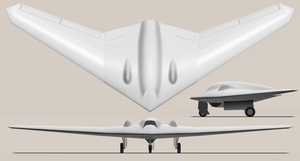Drones: A Global Instrument of Remote Warfare


BAE’s Mantis drone on display
This week’s Farnborough Airshow – with its dedicated unmanned systems showcase – will no doubt generate more media stories on the growing use of both civil and military drones. Indeed BAE Systems has hinted that there will be further contracts signed at Farnborough to take forward the joint UK-French Telemos drone and the companies are also looking to the UK and French governments to fund further drone work. Tom Fillingham of BAE Systems told journalists at recent briefing for journalists:
”At Farnborough we will also look for a positive indication from the governments that they are willing to allow BAE, Dassault and engine suppliers [Rolls-Royce and Snecma] to work on an 18-month FCAS [Future Combat Air System] demonstrator preparation programme.”
Coincidentally this week the Defence Secretary, Philip Hammond, is also due to appear before the Defence Select Committee (12 July) for a session examining “topical issues affecting the Ministry of Defence and the Armed Forces“ and may well say something either about the Telemos programme specifically or the development of unmanned systems more generally.
While the Defence Committee will no doubt raise some questions about the costs and affordability of specific programmes, what is really required from MPs on the committee is that they grasp their public accountability role with both hands and investigate whether the growing use of armed drones is making the UK – and the world – less safe. While it is important that the committee discusses technical and financial questions about the progress of specific drone programmes, it is equally important that the wider ethical and philosophical questions are addressed. Perhaps, as some are suggesting, its time to bring the philosophical big guns to bear on the issue of drones?
In a recent Financial Times opinion piece, Michael Ignatieff quotes Immanuel Kant’s argument from 1795 that “if the consent of the citizens is required in order to decide that war should be declared nothing is more natural than that they would be very cautious in commencing such a poor game”. The problem now, as Ignatieff points out, (and the Defence Committee needs to explore) is that new technology such as drones and cyberwarfare, “make it easier for democracies to wage war because they eliminate the risk of blood sacrifice that once forced democratic peoples to be prudent.”
And if it is easier to wage war with drones – what could the global implications be? According to Sigmund Freud, another 18th Century philosopher – Rousseau – can provide a clue:
”In his essay ‘Reflections on War and Death’ French philosopher Jean-Jacques Rousseau “asks the reader what he would do if without leaving Paris he could kill, with great profit to himself, an old mandarin in Peking by a mere act of his will. Rousseau implies that he would not give much for the life of the dignitary.” Imagine if great numbers could so exercise their will. What violence would be unleashed, how many prostrate bodies around the globe who never knew what hit them.
Imagine indeed. It’s not too difficult to see Rousseau’s nightmare already enfleshed in Warizistan and Yemen.
Defence Select Committee – wider questions
The ongoing questions over physical and psychological distance between those who are targeted by drones and the drone operator also needs to be explored. Twentieth century philosopher Heidegger grappled with the concept that modern technology helps us distance ourselves from the reality of the world and, as has already been pointed out, this analysis too should also be brought to bear on the issue.
This week at Farnborough, the defence companies will no doubt promise us once more that their new military technology will make the world a safer place. While it’s easy for the press and politicians to be impressed by shiny new weapons technology, we need to think deeply and carefully about the moral, ethical and global implications of the drone wars and remote warfare. As Michael Ignatieff said in his piece quoted earlier “These new technologies promise harm without consequence. Kant tells us there is no such thing.”


